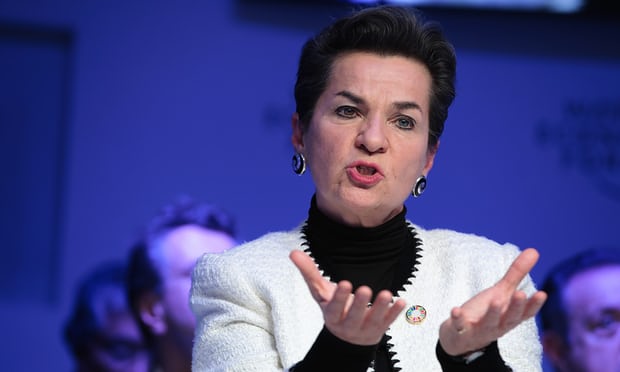Former UN climate chief Christiana Figueres among signatories of letter warning that the next three years will be crucial to stopping the worst effects of global warming

Avoiding dangerous levels of climate change is still just about possible, but will require unprecedented effort and coordination from governments, businesses, citizens and scientists in the next three years, a group of prominent experts has warned.
Warnings over global warming have picked up pace in recent months, even as the political environment has grown chilly with Donald Trump’s formal announcement of the US’s withdrawal from the Paris agreement. This year’s weather has beaten high temperature records in some regions, and 2014, 2015 and 2016 were the hottest years on record.
But while temperatures have risen, global carbon dioxide emissions have stayed broadly flat for the past three years. This gives hope that the worst effects of climate change – devastating droughts, floods, heatwaves and irreversible sea level rises – may be avoided, according to a letter published in the journal Nature this week.
The authors, including former UN climate chief Christiana Figueres and Hans Joachim Schellnhuber of the Intergovernmental Panel on Climate Change, argue that the next three years will be crucial. They calculate that if emissions can be brought permanently lower by 2020 then the temperature thresholds leading to runaway irreversible climate change will not be breached.
Figueres, the executive secretary of the UN Framework Convention on Climate Change, under whom the Paris agreement was signed, said: “We stand at the doorway of being able to bend the emissions curve downwards by 2020, as science demands, in protection of the UN sustainable development goals, and in particular the eradication of extreme poverty. This monumental challenge coincides with an unprecedented openness to self-challenge on the part of sub-national governments inside the US, governments at all levels outside the US, and of the private sector in general. The opportunity given to us over the next three years is unique in history.”
Schellnhuber, director of the Potsdam Institute for Climate Impact Research, added: “The maths is brutally clear: while the world can’t be healed within the next few years, it may be fatally wounded by negligence [before] 2020.”
Scientists have been warning that time is fast running out to stave off the worst effects of warming, and some milestones may have slipped out of reach. In the Paris agreement, governments pledged an “aspirational” goal of holding warming to no more than 1.5C, a level which it is hoped will spare most of the world’s lowest-lying islands from inundation. But a growing body of research has suggested this is fast becoming impossible.

